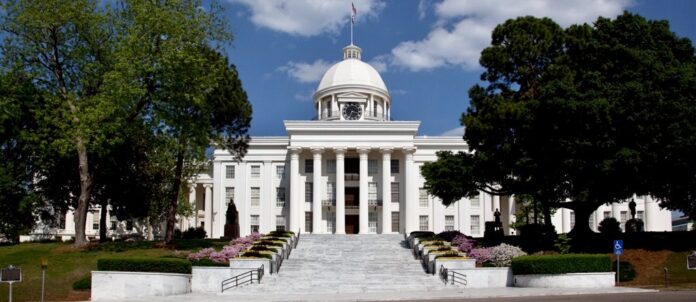“We can do more.”
That was the message Alabama’s newly elected Speaker of the House, Rep. Nathaniel Ledbetter (R-Rainsville) gave lawmakers on Tuesday afternoon. The statement came on the heels of Ledbetter lauding increased state funding for education over the past several years, continued efforts to expand Alabama’s rural broadband capabilities, and job creation.
But what does doing “more” mean? Does it mean doing more to improve the lives of all Alabamians, or just more government growth?
Ledbetter is right in that there are many things the state can be proud of. Although the COVID-19 pandemic shuttered many Alabama businesses for a time, the state had less restrictive and shorter-lived policies than many other states. This allowed Alabama’s economy a swift recovery from the pandemic’s impacts.
Alabama’s unemployment rate is now at a record low of 2.7%, despite spiking to 13.7% in April 2020. While the state’s declining labor participation rate remains a concern, a near-record number of Alabamians are employed, a testament to the state’s economic recovery. Gov. Kay Ivey and the Alabama legislature also approved the use of more than $276 million in American Rescue Plan Act funds for broadband expansion during a 2022 special session. This is a start in boosting Alabama’s infrastructure, though a 2021 report from the Alabama Department of Economic and Community Affairs estimated that it will cost between $4 billion and $6 billion to reach all of Alabama’s underserved areas.
Fueled by this influx of federal stimulus money and a strong economy, Alabama’s government finds itself with more than $3 billion in surplus tax dollars that must be allocated during the 2023 regular session. It is indeed a historic opportunity to “do more.”
On Wednesday, Senate education budget committee Chairman Sen. Arthur Orr (R-Decatur) hinted what “more” might mean when he repeated his expectation that Ivey and the legislature pursue a one-time tax rebate for most Alabamians. “After we take care of state government, at least on the education side, we have enough to send back to the people of Alabama who sent it to us in the first place,” he added.
The Education Trust Fund (ETF) has more than a $2.7 billion revenue surplus. Orr says that lawmakers are considering $500 million in total rebates from this fund. That’s less than 20% of the total ETF surplus. Such a rebate would likely provide checks of $200-$250 to individual filers and $400-$500 for joint returns. Such a rebate would likely provide checks of $200-$250 to individual filers and $400-$500 for joint returns. A one-time rebate would provide limited relief to the impacts of inflation and rising costs of everyday goods that are impacting so many Alabama families and businesses.
One-time relief is certainly better than no relief, but why not “do more”? There are enough surplus tax dollars available to enact historic tax reform legislation.
One possibility would be to use the surplus to repeal the grocery tax, as Alabama remains one of three states that still fully tax the sale of groceries. This would benefit Alabama families every time they go to the store, not just one time.
The surplus could also be used to fully repeal the state’s business privilege tax, providing immediate and permanent relief to businesses still recovering from the pandemic.
“Doing more” could also mean taking fewer income taxes from citizens and businesses, allowing them to keep more of what they earn and reinvesting that money back into Alabama’s economy, benefiting the entire state.
Public school administrators will appreciate another opportunity for the legislature to “do more.” Despite several consecutive raises and a restructured pay scale for public school teachers, education leaders plan to pursue a pay raise for principals and assistant principals in 2023. I don’t want to diminish the role strong leadership plays in student success, but is state government’s main role to take care of itself and its employees, or is it supposed to look out for the best interest of those it represents?
Improving education in Alabama is not just about spending more money. It’s about putting students in the best situation to achieve success. An alternative way to “do more” for education includes pursuing universal school choice, giving parents and students the freedom to choose the type of learning environment best suited to their needs.
The state has collected more tax dollars from Alabamians in the last two years than at any point in history. State lawmakers have an opportunity to “do more” for citizens than ever before. Will they seize it, or use the surplus to continue to grow and protect government?
By JUSTIN BOGIE, Alabama Policy Institute’s Senior Director of Fiscal Policy.




